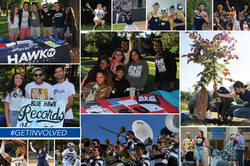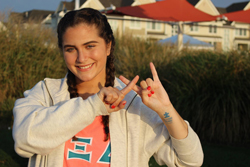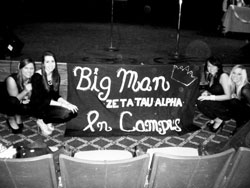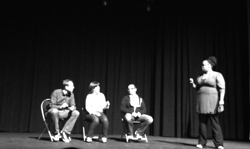Attending college is a colossal investment in one’s future. As a freshman this concept may seem overwhelming; you’ve got four years to gain the skills needed for your career and make the memories that will shape what is claimed to be “the best four years of your life.” But no pressure, right?
Crystalyn Espinal, Assistant Director of Student Activities, is a firm believer that your college experience is truly what you make of it. In order to make the most of one’s college experience, you’ll hear time after time that you must “get involved.” And while it seems as though this sentiment has become cliché, for many students it holds true.
With 120 clubs, nine sororities, seven fraternities, multicultural organizations, honors societies, and student publication and media outlets, Monmouth University has a club to meet anyone’s interests. In fact, if there isn’t already an established club that fits one’s interests, it’s easy to start a new organization on campus. Governed by the Student Government Association (SGA), all on-campus clubs must adhere to a certain standard of conduct and promote the advancement and encouragement of scholarship.
The best way to learn is by doing. Amongst the endless benefits of campus involvement, strengthening one’s professional skill set is of the utmost importance. Future employers want to know more than your grade point average, but how you contributed to the campus community, as well as the “real world” skills you acquired during your studies.
Amy Bellina, Director of Student Activities, said, “As someone works ‘up the ladder’ of club involvement and leadership, they have opportunities to work on projects and programs that help build communication skills, organizational and budgeting skills, goal setting, and sometimes conflict management skills.” Bellina continued, “These are all things that a potential employer would like to know from a resume or in an interview.”
Nicole Gallagher, a senior psychology student, has had the opportunity to gain additional expertise and contacts within her field through her membership with the psychology club. “Through my involvement, I have been able to network with others in my major and those working in the field. The psychology club has helped me with my senior thesis and secure internships.”
Not only does organization membership and a campus job build up your resume, but it also helps you gain a sense of community and truly immerse yourself in the Hawk family. Lauren Niesz, a graduate information systems student, has been heavily involved on campus throughout her educational career. As a commuter student, Niesz began her college career in an endless cycle of going to class and rushing home, which led to her overall dissatisfaction with Monmouth.
After Niesz became more acclimated to college life, she became involved with The Outlook and held a job position on campus. By her senior year, she was a Senior Editor for The Outlook, A Lead Commuter Student Mentor, a PLA, had completed a radio show, worked in the Computer Science & Software Engineering Department for 3 years, and was a part of 3 honor societies. She claims, “Getting involved then became an addiction where I couldn’t get enough of it.”
Niesz feels that Monmouth feels like home because of the numerous connections she has made due to her on-campus involvement. “Spreading myself across different departments and organizations genuinely helped shape my entire future,” said Niesz.
These four years offer endless opportunities to experiment and try a multitude of new things to cultivate new interests or reinforce old passions. “There may never be another time in your life to have so many opportunities at your fingertips. A person can learn more about themselves and develop new interests, and do this pretty easily while in college,” said Bellina.
At times, you are able to discover more about your field and passion outside from the textbooks and through actual experiences. While earning good grades is important, pursuing life-enriching experiences can be just as fulfilling as making the Dean’s List.
“Sometimes as a student, it is easy to focus on one more than the other but a balance between academics and involvement, in my opinion, both offer students the knowledge and practice they need to be successful after school. Make the best of your experience and get involved,” said Espinal.
Taking the first step towards getting involved is the hardest, but you won’t regret it once you become immerses within the Monmouth community. The opportunities to expand one’s resume, make lasting connections with students and faculty, and leave a legacy on campus are endless. “Clubs and organizations are one option, but there is also recreations and intramurals, campus employment, plays, events, athletic competition attendance and much more,” said Bellina.
If you’re interested in getting involved, visit the Monmouth University clubs and organizations page on the website.
IMAGE TAKEN from the Monmouth University Spring Events Calender




